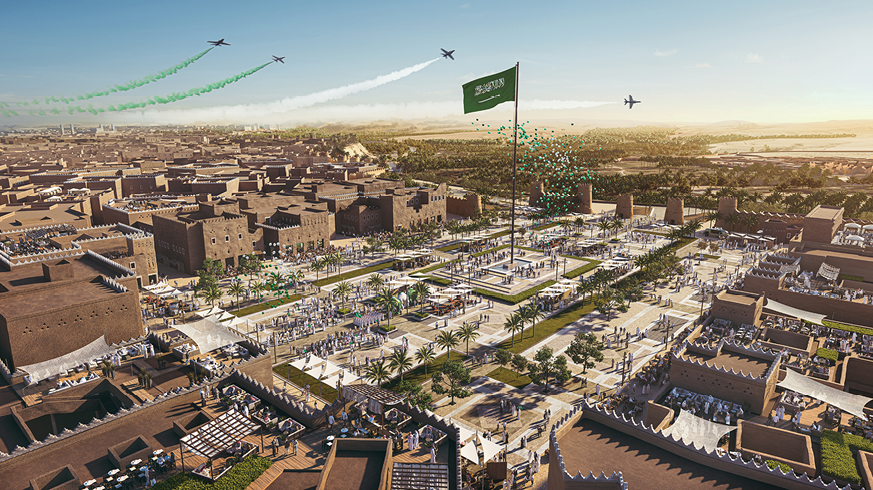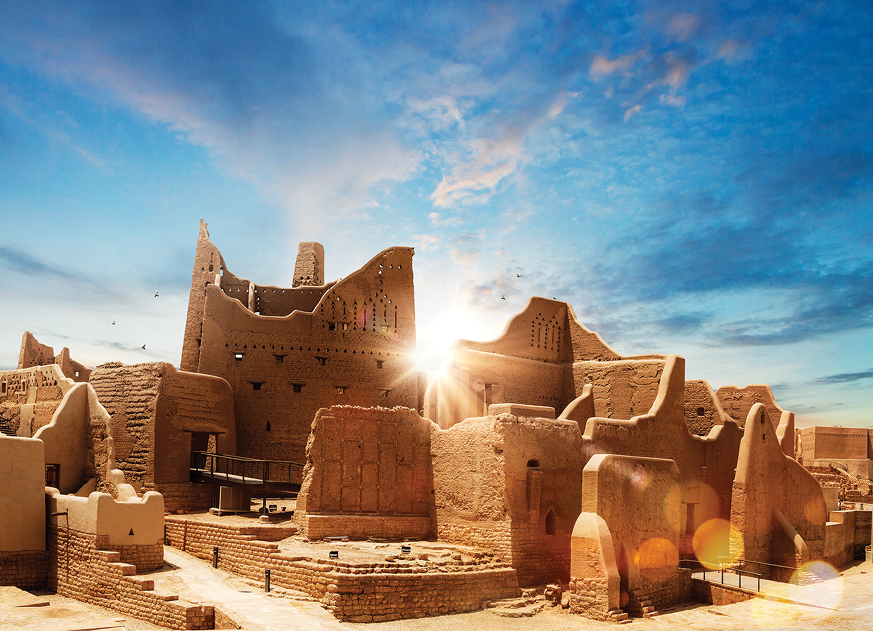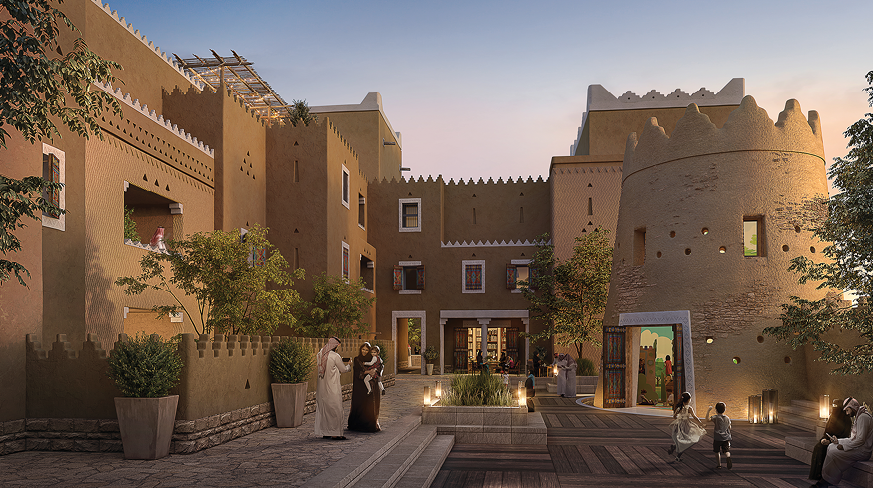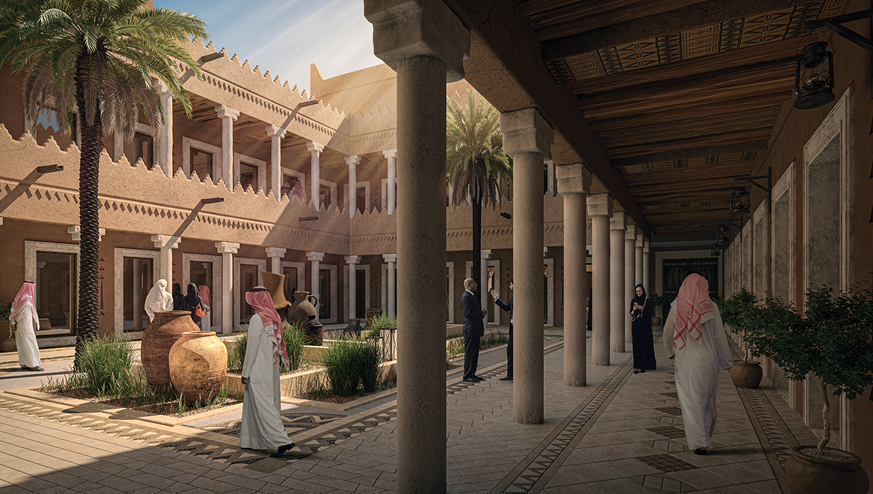- Home
- Media Kit
- MediaJet
- Current Issue
- Past Issues
- Ad Specs-Submission
- Ad Print Settings
- Reprints (PDF)
- Photo Specifications (PDF)
- Contact Us
![]()
ONLINE
![]()
ONLINE

One Diriyah
Editors’ Note
Jerry Inzerillo is a globally celebrated visionary in the hospitality and tourism industry, with a deep aptitude for positioning strategies and iconic developments. In June 2018, Inzerillo was appointed by His Royal Highness The Crown Prince Mohammed Bin Salman of the Kingdom of Saudi Arabia to be the founding CEO of the newly created Diriyah Gate Development Authority, (diriyah.sa), a $50.6 billion project aimed at restoring and reimagining the ancestral home of the original Saudi state. In this role, he is charged with developing and implementing a master plan to turn 70 square kilometers of development area into one of the world’s greatest gathering places, encompassing world-class cultural, entertainment, retail, hospitality, educational, religious, office and residential assets, with the UNESCO World Heritage site of At-Turaif as its center-point. When complete, the development will add 27 billion Saudi riyals to the Kingdom of Saudi Arabia’s GDP, attract 27 million visitors and employ more than 55,000 people. Inzerillo also serves as Vice Chairman of the Forbes Travel Guide. He previously served as President and CEO of IMG Artists, a leader in artist management, performing arts and lifestyle events planning, from 2012 to 2014. From 1991 to 2011, Inzerillo was President of Kerzner Entertainment Group, where he raised the profile of its properties in South Africa, the Bahamas, Dubai, Morocco, Mauritius, Mexico, the Maldives, as well as conceptualized and positioned the start-up of its One&Only and Atlantis brands. He oversaw the launches of The Lost City at Sun City in South Africa, Atlantis in the Bahamas and Atlantis, Dubai. From 1991 to 1996, Inzerillo served as COO of Sun City, the South African resort complex built by Sol Kerzner. While in South Africa, he enjoyed a close personal friendship with President Nelson Mandela and, in 1994, coordinated major portions of his Presidential inauguration in South Africa. In 1987, he was the founding President and CEO of Morgans Hotel Group, later rebranded as Ian Schrager Hotels. While there, he conceptualized and opened Morgans, Royalton and Paramount in New York; the Delano in Miami Beach; and Mondrian in L.A. Inzerillo has long been involved with philanthropy, especially with respect to children, education and HIV/AIDS. He was honored with a Knighthood by the Knights of Malta in Rome, Italy, in 1996. Inzerillo is a founding advisory board member of the Clinton AIDS initiative. In recognition of his leadership and empathetic outreach to the tourism community during the COVID-19 pandemic, he was awarded the prestigious HOTELS Magazine “Corporate Hotelier of the World Award” as well as the “Tourism for Peace Award” by the World Association of Non-Governmental Organizations.

Rendering of Diriyah Gate at King Salman Square
What interested you in the opportunity to lead Diriyah Gate Development Authority and made you feel it was the right fit?
There were three components. First, for someone like me who has been around a while, you don’t get a chance to play in the Super Bowl or the World Cup that often, and when you get the opportunity, you want to be in the game. This is that type of opportunity. I recently had the honor of winning an amazing award, when for the first time in the history of HOTELS Magazine, I was presented the Corporate Hotelier of the World award even though I was not running a hotel company at the time. I was honored to just be nominated with the leaders that were also considered for the award who run some of the great hotel companies in the world, and when I received the award my wife said to me, “you have nothing left to prove.” While that is a nice thing for a wife to say, I still love to play in the big game.
Second, to be in a position to reverse or correct misconstrued stereotypes, which I believe the Kingdom is subject to, and to use hospitality and tourism as an ambassadorial element by having people come and visit a beautiful country, is very powerful. Saudi Arabia had been closed for 90 years, so it is understandable that there may not be a strong awareness of the Kingdom, but now people are able to see for themselves and tourism is playing a vital role in telling the real story about the Kingdom.
Additionally, to be able to manage this development in a G20 country that has the resources, along with the vision and commitment from The Custodian of the Two Holy Mosques His Majesty the King and His Royal Highness The Crown Prince, was very compelling to me since I knew that there was an opportunity to truly make a lasting impact.

UNESCO World Heritage Site At-Turaif, Diriyah
Will you discuss the vision and mission for Diriyah Gate Development Authority?
The Kingdom of Saudi Arabia was founded in a beautiful oasis called Diriyah which was a place that attracted intellectuals and scholars. It had 30,000 people living in what eventually became the largest mud city in the world and was the home of the first Saudi state. His Majesty the King started the restoration of Diriyah in 1998 and it was declared a UNESCO World Heritage Site in 2010. Because of the importance of the location and its history, we created a master plan based on the vision of the King for the future of this jewel from the Saudi past. Our mission is to transform Diriyah into one of the world’s greatest destinations, a gathering place for the entire world and one which will become a source of great pride for all Saudis.
We are celebrating Saudi’s heritage and culture and it is The Crown Prince’s vision to create one of the world’s great G20 cities, which Riyadh is destined to become, and in the middle of Riyadh – elevated on a rock plateau – will be this ten-by-ten square kilometer, historic city known as Diriyah.
How important is it to maintain the history and heritage that you mentioned and to find the right balance in honoring the past while being relevant for the future?
It is critical to The Crown Prince to find the balance between modernity and new urban living while still maintaining the authenticity and the non-compromising nature of Saudi culture, national identity and heritage. One of the ways that The Crown Prince is endeavoring to achieve this is similar to what Lee Kuan Yew did regarding the modernization of Singapore. Riyadh is destined to be a modern city with the most sophisticated technology, sustainable energy and transportation. The Crown Prince is also committed to NEOM, which is the city of the future in the northern part of the Kingdom which is designed to be an accelerator of human progress that will embody the future of innovation in business and livability. This is important since this innovation will be incorporated into Riyadh as it becomes one of the world’s great G20 cities. However, in the middle of Riyadh will be Diriyah with buildings that look like they did 200 years ago which will help protect the Kingdom’s national identity, authenticity, culture and heritage, and which represent the spirit of the nation.
The Crown Prince’s vision is to think what it will take in 5 to 10 years to put Riyadh on the track to be one of the great cities of the world. We have to evaluate what it will take to preserve culture and heritage in the middle of that city, which is Diriyah, and then what will come in the future decades, which is NEOM.

Rendering of Diriyah Square branded residential
What are the keys to building a better global understanding of the Kingdom today?
One of the big challenges for the Kingdom is the issue of perception versus reality in terms of how the society operates, and even, simplistically, how the country looks. If you told someone that you were up to your ankles in snow in the Tabuk region of Saudi Arabia, they would question even the notion of snow in Saudi Arabia. If you told someone that there are beautiful mountain ranges as we have in Taif, they would be surprised. The general thinking is that Saudi Arabia is desert and camels, which are the images people know since the Kingdom was not open until recently. This is why His Majesty the King and The Crown Prince opened the Kingdom to tourism in September 2019 and we were thrilled to show the world the true Saudi Arabia. We were forced to shut down due to the pandemic in March 2020, but we are now back open for tourism.
Building a better understanding of Saudi Arabia is a challenge and priority for us. For most countries around the world, Switzerland or Australia, for example, even if you have never been there, you have a pretty good awareness of what they are like. Saudi Arabia has one of the biggest gaps of all the countries – certainly of all the G20 countries – in perception versus reality. I just had a very successful American businessperson visit Saudi Arabia. At dinner, he told me how much he was enjoying his visit, even though he was initially afraid to come and was not sure about the visit. He was amazed at how friendly the people were and how welcoming the country was as he traveled around the Kingdom.
One of our major tasks is to launch an enormous marketing effort to present the real images of the Kingdom and to highlight the interactions of the people visiting Saudi Arabia for concerts and sports events and tourism in order to build a better understanding and appreciation for Saudi Arabia today.

Rendering of Diriyah Square offices
How critical is it for the Kingdom to invest in and train the hospitality workforce of the future as it increases its tourism efforts?
This is probably the number one item we talk about and is certainly a focus for The Crown Prince. Our terrific Minister of Culture, His Highness Prince Badr bin Abdullah bin Farhan, and our wonderful Minister of Tourism, His Excellency Ahmed Al Khateeb, are clear that even if you have the money and resources to invest in tourism, as we are doing – we will have 38 hotels in Diriyah designed by the best designers in the world, including Saudi designers – it is critical to have a talented and skilled workforce. This is why we are putting billions of dollars into education and training throughout high school, college and graduate schools in the areas of hospitality and entertainment. We are partnering with some of the leading organizations and universities around the world and are sending our young people to get trained and learn skills that will make them successful in the hospitality industry.
How important is Vision 2030 to the future of the Kingdom?
Vision 2030 is critically important. A vast majority of Saudi people are under the age of 35, and many Saudis are coming home because they are excited about the future of the country. With a young population that is very positive, very focused, very forward-thinking, and that is united behind a vision for the future, there is a unified feeling among the people. This is so different than in many parts of the world where people are polarized and cannot even have productive conversations if they disagree – everything has become personal. America in many pockets has lost its natural DNA of positivity and optimism and is certainly no longer bound together by a national agenda.
This national agenda is present in Saudi Arabia with Vision 2030, and we will begin opening major assets in 2022 and will continue doing this every year until 2030. This is very important from an aspirational standpoint, since as opposed to mentioning grandiose plans and having the people wait to see if it is actually coming and what impact it will have, in the Kingdom you will be able to see these assets being delivered each year.
In regard to Diriyah, it is vital that we come out first being located in the center of Riyadh because we are the emblem of Vision 2030.
How did Diriyah Gate Development Authority adapt the way it works to address the challenges caused by the pandemic?
Credit must be given to The Crown Prince because during COVID he had every reason to back off a little bit. First, it is important to mention that His Majesty the King and The Crown Prince did not spare one penny when it came to the health and wellness of the society. The King went on television and said that COVID is not a Saudi condition, it is a human condition. He said that the Kingdom was going to pay for tests and would make sure those in need had the best treatment and care and the Kingdom has done an exceptional job of addressing COVID. Even as the government made sure to address the needs of the people and spent massive amounts of money to best approach this challenge, they never slowed down the big projects underway and fully funded these projects. We did not lose any momentum, although a difficult issue was regarding talent and the workforce since many people from other countries did not want to leave their homes and families during this unprecedented time.
How important is it in your role to have such strong support and commitment from His Majesty the King and The Crown Prince?
It is critical. One thing that is not well known outside of Saudi Arabia is that the King is the number one historian in the Kingdom. This is important to mention since at the time when the Saudis hit oil and had vast resources available to them, it was a modest country. It then came into this vast wealth and wanted to catch up to international standards in education, health, technology, industry – helping its own people by providing opportunity for a good quality of life. His Majesty the King has been a leader in finding the balance of celebrating the past while looking forward to the future, and this is also of great importance to The Crown Prince. They have made my job much easier and have given me everything I need in terms of manpower and resources, and it is my responsibility along with my team to meet their expectations and fulfill their vision.
What do you see as the keys to effective leadership and how do you describe your management style?
For me, leadership is about setting the direction and priorities, and then providing the team with the tools they need to execute. We have many pictures of our team putting one finger in the air, which signifies One Diriyah, which means that every individual counts toward our success. Diriyah is the jewel of the Kingdom, its first state – there is only one Diriyah – one Kingdom, one purpose, unified. Leadership is also about growing the team and talent to be the future leaders of the organization.
When you look at my career, there are those who might say that I am not a developer, but rather an innkeeper. I have had a diverse career experience with leading brands and involvement in a wide range of projects. Whatever word you use to describe my career, leadership is leadership. When you have a great boss like I do, it is about building a team and executing. The Crown Prince is engaged in all aspects of this project, including approving all renderings and designs, and that engagement is critical to our success.
Travel and tourism is the largest industry in the world. Do you feel that the industry has done an effective job at telling its story and how vital it is to the global economy?
Globally, we had not done a good job in the past, but that is changing. We are going to be hosting the global conference of the World Travel & Tourism Council (WTTC) later this year and WTTC has played an important role with its mission to maximize the inclusive and sustainable growth potential of the travel and tourism sector by partnering with governments, destinations, communities, and other stakeholders to drive economic development, create jobs, reduce poverty and enhance security and understanding in our world.
We have seen major growth in the number of countries that have a Minister of Tourism because countries realize the impact that travel and tourism have on creating jobs and increasing economic growth. The industry employs a diverse workforce and provides tremendous career opportunities.
What advice do you offer to young people interested in building a career in the hospitality industry?
I tell young people that tourism is an amazing industry. If you analyze all the global industries, you will not find a less discriminatory industry than tourism. It does not matter what your gender or your nationality is, if you love to serve and enjoy caring for people, it is a wonderful industry. Every day is different and there are so many facets to explore and pursue.![]()